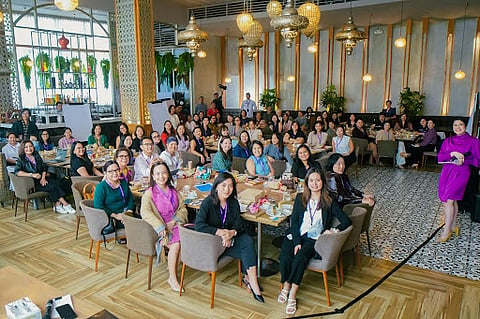
- NEWS
- the EDIT
- COMMENTARY
- BUSINESS
- LIFE
- SHOW
- ACTION
- GLOBAL GOALS
- SNAPS
- DYARYO TIRADA
- MORE

UN Women, GCash, and Connected Women recently gathered more than 70 women leaders from across sectors for the 2025 Women in Tech Summit titled “Our Seat at the Table.” The event, held in Metro Manila, served as both a summit and strategy session to identify pathways that advance women’s participation in the tech space.
The discussions formed part of UN Women’s Gender Action Lab (GAL): Innovation for Impact — a regional platform that combines private sector engagement, gender advocacy, and innovation. The initiative is backed by the Women’s Empowerment Principles (WEPs) and supported by the Australian Department of Foreign Affairs and Trade.
The summit focused on generating practical insights that could inform future policy recommendations and ensure women and girls benefit more equitably from digital transformation.
Australian Ambassador to the Philippines HK Yu PSM, FCPA (Aust), gave the keynote, offering three ideas for participants to reflect on: giving women a voice, investing in them, and applying “positive bias” to accelerate inclusion.
“The first thing is to give women and girls a voice [and then] create platforms like this for [those] voices to come through,” began Ambassador Yu. “The second thing is to invest in women and girls, [which] can be done at the highest level—through your companies and your government—and the individual level.”
Ambassador Yu also cited ways Australia puts gender equality at the center of diplomacy. “In everything we do, we ask the question: ‘[This should be] 50-50, and if it’s not, why not?’” The principle is used in Australian policies; for example, Australia has a target that more than 80% of development programs should effectively address gender equality.
To touch on the third and final tenet, Ambassador Yu shared some statistics of note: Today, women and girls are 20% less likely to have smartphones, and 28% are less likely to have access to the internet. She shared: “Another challenge for this particular set of sector leaders is [to ensure that] whatever innovation or product you come up with in your area [is] woman- and girl-friendly.”
“What are we doing to rebalance this so that we women and girls get the advantage?” asked Ambassador Yu. “I call [the solution] ‘positive bias.’ As leaders, you have the power to make a huge difference, so apply positive bias. Let’s [ensure] we achieve a world where there is true equality and where women and girls always have a seat at the table.”
Rowie Zamora, the Chief Strategy Officer of GCash, further set the tone for the event, reminding attendees about the innate responsibility to apply that positive bias. “Gone are the days when people are surprised that we have women tech leaders, CEOs, and public sector leaders, but we need to acknowledge that there’s still a long way [to go],” she shared. “Now the real work ahead of us is to think of the rest of the women inside and outside NCR who still need help to be part of the digital economy.”
The summit featured five sector-specific roundtable discussions, each focused on critical themes affecting digital inclusion. These included digital entrepreneurship, education and skills development, corporate leadership, technology and innovation, and cybersecurity.
Among those who led the discussions were Connected Women founder Gina Romero; WomenBizPH Chairperson and Airspeed CEO Rosemarie Rafael; Accenture Country Lead Ambe Tierro; and Women in Security Alliance Philippines President Mel Migrino.
ILO Philippines’ Linartes Viloria and FELTA MultiMedia CEO Mylene Abiva also facilitated sessions that explored both structural barriers and practical solutions to upskilling and tech access for women.
The multi-sector participation helped ensure a well-rounded discussion—addressing not just individual challenges, but broader systemic hurdles to digital empowerment.
“The integration of technology in the lives of women and girls is a tool for empowerment [and simultaneously] a vehicle for societal transformation,” said Antoinette Santos, the Programme Analyst for the UN Women Gender Action Lab.
“Let us advocate for policies and programs that uplift women and bridge the gender gap,” added Santos. “Let us mentor and nurture the next generation of women leaders in technology and beyond. Let us work tirelessly toward creating a world where every woman and girl can flourish, regardless of the obstacles in her path.”
The summit capped off GCash’s Women’s Month campaign and kicks off its Women in Tech Month celebration this April. The company — largely women-led — has emphasized advocacy in digital finance and inclusion, aiming to expand its reach to more women in underserved communities.
For UN Women, the Gender Action Lab will continue to serve as a platform to test ideas and scale up initiatives that promote inclusive innovation. For Connected Women, the event reinforces the value of community-building among women working in or entering the tech sector.
As these organizations continue their work, “Our Seat at the Table” reflects both the progress that’s been made—and the conversations still needed to ensure digital transformation works for everyone.
